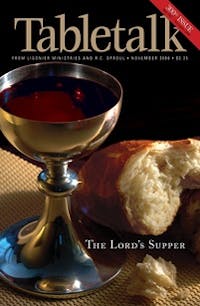
Request your free, three-month trial to Tabletalk magazine. You’ll receive the print issue monthly and gain immediate digital access to decades of archives. This trial is risk-free. No credit card required.
Try Tabletalk NowAlready receive Tabletalk magazine every month?
Verify your email address to gain unlimited access.
Just over a year ago I had the opportunity to travel to Yerevan, Armenia, to minister among Iranian Christians who had traveled from Iran for a conference that was held on discipleship and Christian education. Without a doubt, I learned more from my Iranian brothers than they learned from me. Their passion and piety for Christ and His church challenged me beyond measure, and their understanding of what it means to be persecuted for the sake of Christ is a sure sign of God’s blessing upon them and their churches throughout Iran. Towards the end of our time together, we held a worship service on the Lord’s Day during which I was given the opportunity to help administer the sacrament of the Lord’s Supper and pronounce the words of institution found in 1 Corinthians 11.
After the service, one of the men came to me and with great passion explained how one of the phrases from the words of institution caught his attention; it was the phrase found at the beginning of Paul’s proclamation: “the Lord Jesus on the night when he was betrayed…” (1 Cor. 11:23). My Iranian brother explained how significant those words were to the historic events surrounding Jesus’ words that night in the upper room. During the institution of the greatest and most beautiful of all Christian celebrations, there was deception and betrayal. In the midst of evil, God established good. While the Prince of Peace was giving Himself to His disciples, the Prince of Darkness was trying to kill Him. At the precise time when God’s eternal, sovereign plan of redemption was coming to pass, His kingdom feast was being inaugurated.
My Iranian brothers know what it is like to worship Christ under the constant threat of governmental and cultural discrimination. Nevertheless, they proclaim their faith boldly through the visible sign of the Lord’s Supper knowing full well that such an act of obedience to God could bring them persecution from men. It is no small reason that the apostle Paul, in writing to the early, persecuted church, concludes with these words: “For as often as you eat this bread and drink this cup you proclaim the Lord’s death until he comes” (v. 26). As we live and die before the face of God, coram Deo, we proclaim the Lord’s death until He comes and we see Him face to face (1 Cor. 13:12).
